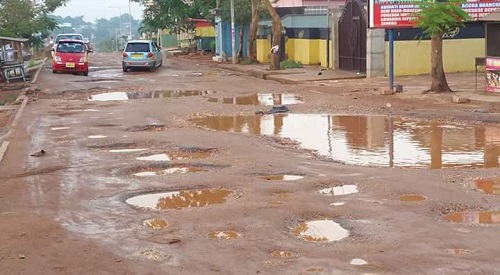
Are terrible roads worth DVLA roadworthy levy?
A few months ago, my windshield reminded me that it was time to renew my vehicle’s roadworthy certificate.
Advertisement
It is a pain paying for that certificate these days.
I do it grudgingly, and I believe many other Ghanaians feel the same way.
It is not the amount, but the idea behind it.
For many Ghanaians, navigating the challenging terrain of poor roads is a daily reality, and it raises a pressing question: Is it worth subjecting our cherished vehicles to the wear and tear caused by potholes, bumps and gullies, only for the state to turn around and ask us to test the roadworthiness of our cars?
Many roundabouts in Accra today pose danger to commuters – Achimota Mile 7, Atomic Junction and Industrial Area, among others — and are in dire need of repairs, as gaping potholes force drivers to avoid them, often ending up with undesirable consequences.
The remnants of shattered glasses at these spots sometimes are the obvious signs of accidents that happen.
And then, there are the craters at the Ritz Junction heading to Ashale Botwe; the fast-developing potholes on the Agbogba-Ashongman road; the waist-breaking SSNIT Clinic Road heading into the CFC Estate and many others dotted within Accra.
These days, I make it a hobby to count the potholes – those notorious road hazards are a menace to every driver in Ghana.
They lie in wait, ready to wreak havoc on our tyres, suspension systems and peace of mind.
Far from exaggerating, striking a pothole even with a minimum speed can result in immediate damage, leaving you with a hefty repair bill and a sinking feeling in your stomach.
Driving on these roads riddled with craters exposes our vehicles to an unrelenting assault.
The suspension system, engineered to absorb shocks and provide a smooth ride, is pushed to its limits.
Tyres, often the first point of impact, endure wear and tear that can lead to blowouts and misalignment.
Over time, the repeated jolts can affect wheel alignment, causing uneven tyre wear and reduced fuel efficiency.
In an economy where prices keep changing by the day, the financial consequences of navigating Ghana's poor roads are significant.
Repairs to a car's suspension, alignment and tyres can quickly deplete one's savings.
How are we counting the cost of these bad roads?
I have not even mentioned the many accidents that have snatched productive lives, both young and old.
A few years ago, Vice-President Dr Mahamudu Bawumia mooted the idea of moving away from asphalt to concrete roads.
It appears that the idea suffered a stillbirth, because even the motorway, the national expressway, which was constructed with concrete more than five decades ago, needs urgent repairs.
Inner roads in our communities, which could have come to our rescue, are left untarred.
I wonder how residents of most parts of Ghana survive, given what I go through driving through some parts of Achimota, Dome, Agbogba, Haatso and their environs.
For friends who live in places like Bortianor, Nmai Dzorn and Frafraha, it is hell going in and out of their homes.
But these people are compelled by the law to pay roadworthy for roads that are fast damaging their cars.
How is the state justifying the demand for roadworthy renewal for our cars when our roads mock the term?
In an era when everything about cars is going up, the introduction of the new combustion tax and insurance, among others, the least the government could do is to keep our roads motorable.
We deserve better roads; our cars also deserve them.
The writer is Chancellor, Wisconsin International University College, and Immediate President-General of the West Africa Nobles Forum.




